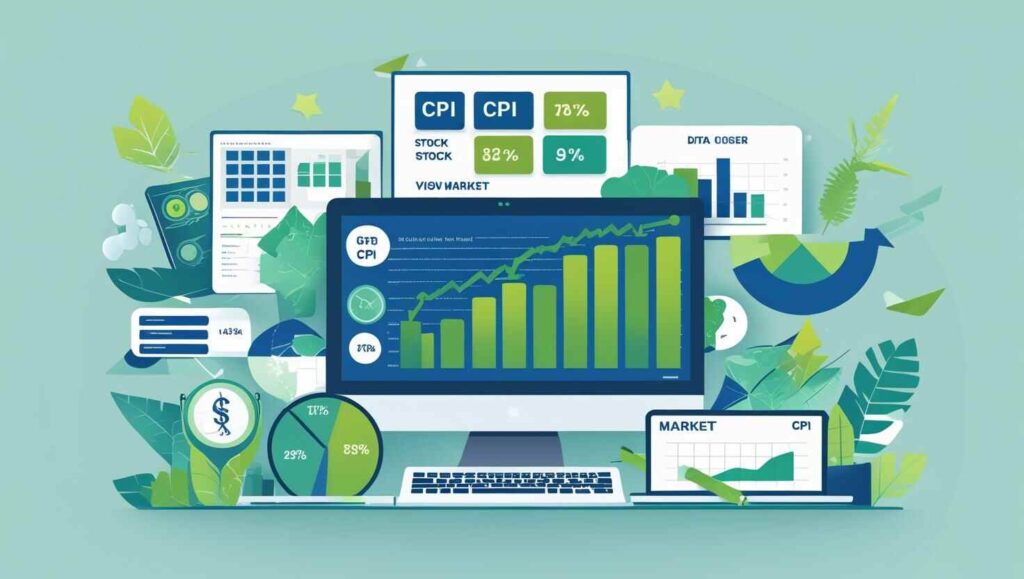What Does CPI Mean for the Stock Market?
Introduction: CPI and the Market – What’s the Connection?
Understanding Inflation’s Impact on Your Investments: If you’ve ever seen the stock market swing wildly after a government report and wondered why—it’s probably because of the CPI. The Consumer Price Index (CPI) is one of the most important indicators for understanding inflation in the U.S. economy. But what exactly is CPI, and how does it affect your stocks?
In this guide, we’ll break down what CPI means, why investors care, and how CPI reports move the stock market—in plain English.
Does CPI affect the stock market?
HOW Does CPI affect the stock market: the Consumer Price Index (CPI) significantly impacts the stock market, acting as a crucial barometer for inflation and influencing investor sentiment and Federal Reserve policy. When CPI data is released, it can trigger immediate market reactions: higher-than-expected inflation often signals potential interest rate hikes by the Fed, which can dampen corporate profits by increasing borrowing costs and making “safer” investments like bonds more attractive, leading to a sell-off in stocks. Conversely, lower-than-expected or stable CPI might suggest the Fed has more flexibility to maintain or lower rates, boosting economic growth prospects and often supporting higher stock valuations, particularly for growth-oriented companies. Therefore, understanding CPI movements is vital for stock market participants, as it directly informs investment strategies and portfolio adjustments.

What Is the Consumer Price Index (CPI)?
The CPI measures the average change in prices over time for a basket of everyday goods and services—like food, rent, gas, and medical care. Published monthly by the U.S. Bureau of Labor Statistics (Basic Life Support)BLS, it’s one of the most widely watched economic indicators.
Quick Example: If the CPI rises 3% year-over-year, it means the cost of living went up 3% compared to the same time last year.
Why Does the Stock Market Care About CPI?
Investors pay close attention to CPI because it directly influences:
- Inflation expectations
- Interest rate decisions by the Federal Reserve
- Corporate profit margins
- Consumer spending behavior
When CPI comes in higher than expected, it signals rising inflation—this usually worries the market. Higher inflation often leads the Federal Reserve to raise interest rates, which can hurt stock prices.
How CPI Affects Different Parts of the Stock Market
Go to Homepage
Let’s break down how different sectors react to CPI changes:
| CPI Reaction | Sector Impact |
| Higher CPI | Tech & Growth Stocks Fall – Higher interest rates reduce future earnings potential |
| Lower CPI | Markets Rally – Eases pressure on the Fed, boosts investor confidence |
| Sticky Inflation | Energy, Utilities, and Consumer Staples may outperform |
| Falling Inflation | Financials may lag as rate hike cycles pause or reverse |
When Is the CPI Report Released?
The CPI is typically released around the second week of every month. For example:
- June 2025 CPI Report → Expected Release: July 11, 2025
- Check BLS.gov for the full release calendar.
What Happens to the Stock Market on CPI Day?
Scenario 1: Hot CPI Report (Higher Than Expected)
- Stocks usually drop immediately
- Bond yields rise
- Gold and inflation hedges may gain
Scenario 2: Cool CPI Report (Lower Than Expected)
- Stocks tend to rally
- Fed may pause or delay rate hikes
- Growth sectors (tech, consumer discretionary) often lead
Tips for Stock Market Investors: How to Use CPI Data
- Watch the Forecast vs. Actual
- Markets react to the surprise, not the number itself.
- Focus on Core CPI
- Excludes food and energy—better reflects long-term trends.
- Look for Trends, Not One-Offs
- One hot report doesn’t always change the Fed’s path, but multiple reports might.
- Use CPI to Guide Sector Rotation
- Defensive sectors outperform during high inflation.
- Be Cautious on CPI Day
- Expect volatility. Don’t make emotional trades based on headlines.
Common Questions About CPI and Stocks
What’s the difference between CPI and core CPI?
Core CPI excludes volatile items like food and energy. Investors often focus on this version for clearer long-term inflation signals.
Does a high CPI always mean the stock market will crash?
Not necessarily. It depends on how much the CPI deviates from expectations and how the Fed responds.
How can I track CPI’s effect on my investments?
Use tools like:
- Google Trends to monitor market sentiment
- Yahoo Finance or TradingView to watch sector movement on CPI day
- FRED or BLS.gov for historical CPI data
Final Thoughts: CPI Is the Market’s Inflation Thermometer
Understanding CPI is like reading the weather forecast for the economy. It helps you prepare, adjust your portfolio, and avoid panic when the market reacts.
So the next time you hear “CPI came in hot,” you’ll know exactly what that means—and more importantly, how to respond as an investor.
